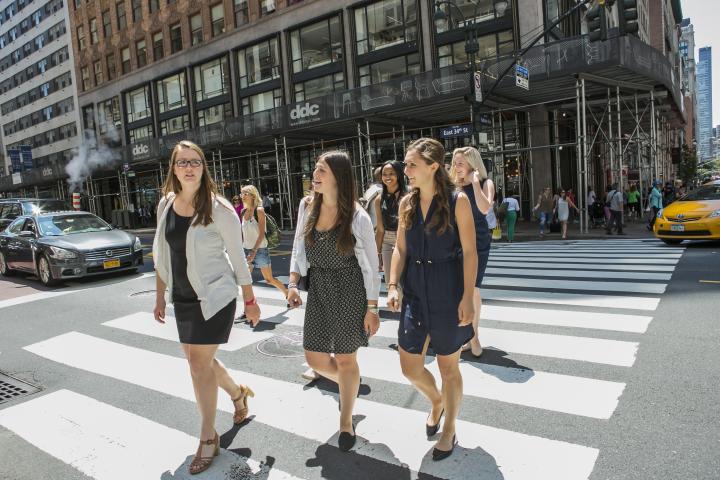
James Lowell Jackson ’17
James Lowell Jackson ’17 was interested in the ILR School because of the way it combined so many of his interests. When Lowell was admitted, he was excited to study government, economics and social justice issues.
A class on modern Asian history, however, lit a passion for foreign affairs, which he grew through taking ILR courses in international and comparative labor.
Lowell had the opportunity to learn even more about international labor through ILR’s Vietnam Winter Break program. A member of ILR’s first cohort to Vietnam, Lowell and three other students travelled to Ho Chi Minh City, where they worked with students at Ton Duc Thang University to learn about labor relations in Vietnam.
They toured factories and met with stakeholders representing workers, companies, and international organizations. “I became aware of all the complexities of labor relations and its intersections with international development, politics and social protection, all in an international context.”
After graduating from ILR, Lowell worked as a legal assistant in Chicago before returning to the ILR School as a research associate with the New Conversations Project. The project brings together researchers working on strategies that improve labor standards across global supply chains. In his two years with the project, Lowell has worked on research related to social dialogue, social protection and the effects of COVID-19 on workers in the garment industry.
A recent recipient of a Rangel Fellowship, Lowell will take this international knowledge to diplomacy. Funded by the U.S. Department of State and administered by Howard University, the Rangel International Affairs Graduate Fellowship Program supports individuals pursuing careers in the Foreign Service by funding a relevant master’s degree and providing professional development opportunities including skills training, internships and mentorship.
Lowell has long been interested in foreign service, attracted to how the dynamic career offers the opportunity to live in different countries and promote peace, security, and prosperity internationally. He had actually applied to the Rangel Fellowship while a senior at the ILR School and was selected as an alternate. He encourages those interested in the foreign service to continue to apply even if they are not selected at first, as many Foreign Service Officers enter the foreign service after multiple attempts.”Don’t feel discouraged about not getting a fellowship or passing the test the first time around -- keep trying and re-apply.”
To other students interested in building a career in international relations, Lowell recommends learning a foreign language and seeking meaningful international experiences while in school. “Take advantage of those opportunities while you have them and reflect on what issues you're passionate about, what regions are interesting to you, and then map out your personal and professional journey accordingly.”
The Rangel Fellowship will support Lowell throughout two years of graduate studies on a topic related to foreign affairs. During the summer of 2021, Lowell will supplement these studies by interning with a member of Congress on issues related to foreign affairs. During the summer of 2022, the U.S. Department of State will send him overseas to intern in a U.S. embassy or consulate. In summer 2023, Lowell expects to complete the program and begin work as a U.S. diplomat. “This door has opened, and I still have a long way to go, but I’m really excited for the journey.”
Here, Lowell answers a few questions about his ILR experience:
How has ILR changed you?
It's hard to pick one thing! ILR broadened my horizons across multiple fields: labor relations, development, law and history to name a few. Academically, ILR helped me improve as a writer and researcher. The School provided me with international opportunities to pursue my interests and gain meaningful experiences. At ILR, I met a dynamic group of students who kept me motivated and with whom I remain lifelong friends. The faculty and staff, such as Sarosh Kuruvilla, Donna Ramil and Richard Fincher have been fantastic mentors, who guided me as a student and even after as an alum.
How are you making an impact through your experiences at ILR?
In my current role at the New Conversations Project, our research has the purpose of improving working conditions for workers in global supply chains. I think that my ILR education showed me the power that sound academic research can have in influencing policies that improve outcomes for workers around the world.
How might the mission of ILR shape the next 75 years of work, labor, and employment?
A changing technological landscape is challenging how we view work, structure employment, and organize workers. It's important that we can think about the global implications of these changes. How will automation affect jobs in the U.S. but also in developing countries? Are current labor relations systems fit for purpose for the next 75 years? Fortunately, ILR is keeping pace with faculty, researchers and students at the forefront of answering these questions.


